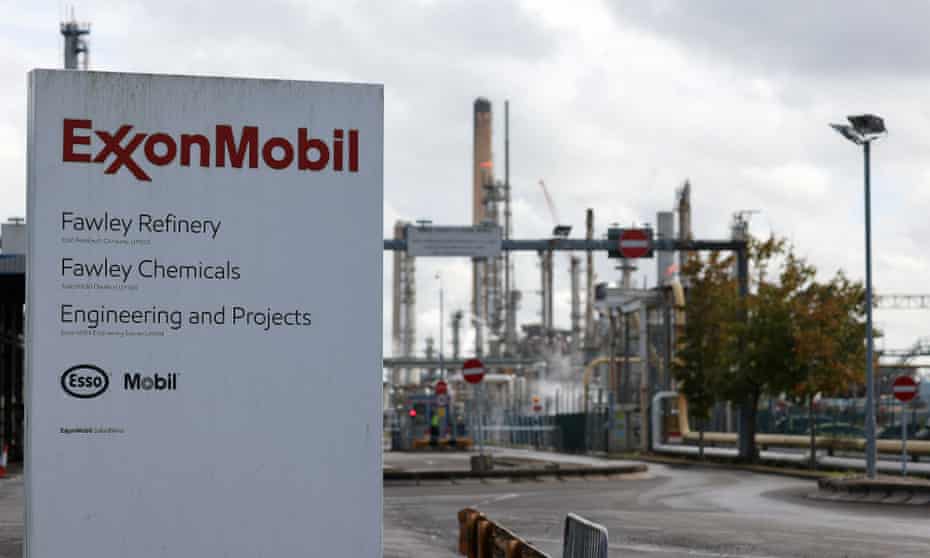Oil executives face ‘turning point’ US congressional hearing on climate crisis
The heads of top US oil companies will answer accusations that their firms have spent years lying about the climate crisis

The heads of major oil companies will make a historic appearance before Congress on Thursday to answer accusations that their firms have spent years lying about the climate crisis.
For the first time, the top executives from the US’s largest oil company, ExxonMobil, as well as Shell, Chevron and BP will be questioned under oath about the industry’s long campaign to discredit and deny the evidence that burning fossil fuels drove global heating.
A leading critic of the petroleum industry behind the hearing by the House oversight committee, Representative Ro Khanna, said the executives’ testimony has the potential to be as significant as the 1994 congressional hearing at which the heads of the big tobacco companies were confronted with the question of whether they knew nicotine was addictive.
They denied it and that lie opened the door to years of litigation which resulted in a $206bn settlement against the cigarette makers.
Khanna told the Guardian that the oil company chiefs face a similar moment of reckoning.
“They’ve got a very tricky balance. They either have to admit certain wrongdoing or they run the risk of lying under oath. If I were them, I would come in with more of a mea culpa approach and acknowledge what they’ve done wrong,” he said.
“It’ll be a turning point for them. It could be the big tobacco moment. We’ve never had a situation where the big oil executives have to answer under oath for their company’s behaviour.”
Khanna said that he wanted Americans to take away the message from the hearing that the oil companies “knew they lied” about the climate emergency.
The CEOs, who have opted to testify by video, are Darren Woods of Exxon, David Lawler of BP American, Michael Wirth of Chevron and the president of Shell, Gretchen Watkins.
The leaders of two powerful lobby groups accused of acting as front organisations for big oil, the American Petroleum Institute and the US Chamber of Commerce, will also testify.
Khanna said the oil chiefs will be confronted with evidence of a persistent and coordinated cover-up, including documents that have not been made public before.
“The documents confirm the misinformation and deception that they’ve engaged in in the past explicitly, and that they continue to engage in through third parties,” he said. “The record is so clear that they will be risking perjuring themselves if they deny the record.”
But the hearing will also be a test for whether the oil industry’s critics can back up their claims of a sprawling conspiracy by the fossil fuel companies to block action on the climate emergency – an accusation also made in dozens of lawsuits by US states, municipalities and private organisations.
Geoffrey Supran, a research associate at Harvard’s department of history of science and co-author of a groundbreaking study of Exxon’s communications on the climate crisis, said the oil executives are well-practiced at sidestepping responsibility.
“This will be a challenging hearing. This is a situation where the historical record is incontrovertible but the climate denial machine has been like a sprawling, well-oiled, well-funded network for decades,” he said. “Given the range of actors and tactics involved, asking the right questions at the right time, having the right documents at your fingertips to pin them into a corner is tricky.”
The hearings follow the release of a growing body of evidence that the oil industry knew about and covered up the growing threat from burning fossil fuels for decades. That includes a raft of Exxon documents held at the University of Texas, and uncovered by the Columbia Journalism School and the Los Angeles Times in 2015.
In 1979, a study by Exxon’s own scientists concluded that burning fossil fuels “will cause dramatic environmental effects” in the coming decades. It called the issue “great and urgent”.
Exxon’s response to that and similar warnings was to shut down research into global heating and to go on a public relations offensive to discredit climate science as no more than a theory, and to shift responsibility on to consumers.
In 2019, Martin Hoffert, a professor of physics at New York University, told a congressional hearing that his climate modelling for Exxon in the 1980s showed that burning fossil fuels was “increasingly having a perceptible influence on Earth’s climate”.
Meanwhile the company was pushing a different narrative.
“Exxon was publicly promoting views that its own scientists knew were wrong, and we knew that because we were the major group working on this. This was immoral and has greatly set back efforts to address climate change,” said Hoffert.
Other oil firms face similar accusations alongside trade groups and thinktanks they funded to deny climate science.
This story is published as part of Covering Climate Now, a global collaboration of news outlets strengthening coverage of the climate story
.png)